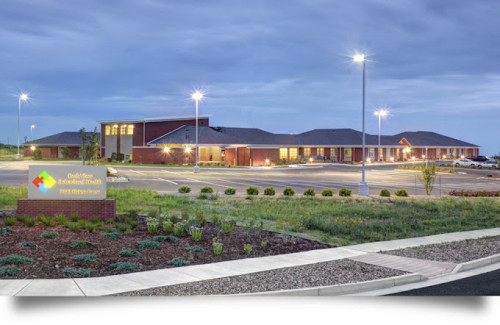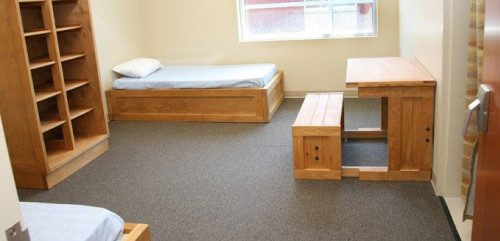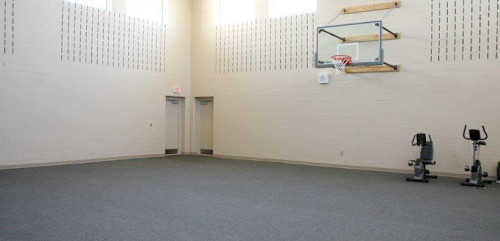






Peak View Behavioral Health Colorado
Treatment Focus
This center treats substance use disorders and mental health conditions. You'll receive individualized care catered to your unique situation and diagnosis, learn practical skills for recovery, and make new connections in a restorative environment.
Primary Level of Care
Offering intensive care with 24/7 monitoring, residential treatment is typically 30 days and can cover multiple levels of care. Length can range from 14 to 90 days typically.
Claimed
Recovery.com has connected directly with this treatment provider to validate the information in their profile.
Treatment Focus
This center treats substance use disorders and mental health conditions. You'll receive individualized care catered to your unique situation and diagnosis, learn practical skills for recovery, and make new connections in a restorative environment.
Primary Level of Care
Offering intensive care with 24/7 monitoring, residential treatment is typically 30 days and can cover multiple levels of care. Length can range from 14 to 90 days typically.
Provider's Policy
During our admissions process, we will process your insurance information so that you have up-to-date information about what your benefits cover.
Peak View Behavioral Health Colorado
Peak View Behavioral Health Colorado
About Peak View Behavioral Health Colorado
Specialized Programming
Peak View Behavioral Health offers a continuum of care for adolescents, adults, and seniors who are struggling with mental health and substance abuse disorders with their dual-diagnosis inpatient, outpatient, and aftercare services. They provide specialized and personalized care for teens, young adults, and military, as well as seniors. A multidisciplinary team of psychiatrists and clinicians provide multi-modal psychotherapy, using evidence-based methods such as cognitive behavioral therapy (CBT), dialectical behavioral therapy (DBT), and trauma-informed care.
Their inpatient process begins with a thorough assessment and diagnosis, along with rapid stabilization services for acute psychiatric issues or detox services for clients in need. Patients will then enter residential care with a treatment plan that is individually tailored to their unique needs. Their residential program provides a home-like environment with mountain views and beautiful lighting, along with amenities such as courtyards and gymnasiums.
Services are available for adolescents aged 12-17 needing acute inpatient psychiatric care from master’s level therapists and physicians. Along with assessment and diagnosis, Peak View works with patients and their families to stabilize and effectively treat psychiatric, emotional, and behavioral challenges, also providing aftercare support.
Peak View’s mental health treatment offers individualized treatment, medication management, educational classes, and discharge planning. Clients of all ages in crisis can find inpatient psychiatric or substance abuse treatment with evidence-based, experiential, and recreational therapies. They also offer elective electroconvulsive therapy for patients with severe depression, suicidal ideation, or bipolar disorder with severe episodes of depression and mania who do not respond to traditional treatment.
For adults with substance use disorders, Peak View provides medically monitored detoxifications, co-occurring and personalized treatment, relapse prevention planning, and aftercare services. The detox process is monitored by trained medical staff 24/7 in a safe and comfortable environment. Clients participate in individual and group therapy, receive addiction education, and dual-diagnosis treatment for mental health disorders like depression and anxiety with trauma informed care.
Continuum of Care
Their outpatient services offer full-day treatment, 5 days per week. Patients practice skill-building, therapeutic processing, and receive client centered care with evidence-based modalities. Along with their partial hospitalization program (PHP), they offer an intensive outpatient program (IOP) as a step down, followed by outpatient visits in person or virtually as their final level of care. Their outpatient programs also involve experiential therapies such as yoga, art and music therapy, and animal therapy. Outpatient services are for adolescents and adults with mental health or co-occurring substance abuse disorders, meeting anywhere from 3-5 days per week for 3-6 hours per day depending on the program.
Peak View Behavioral Health’s full cycle of care includes family involvement and education, and up to 12 months of aftercare visits and services. They provide community resources, referrals, and assist patients in connecting with nearby alumni. Peak View Behavioral Health accepts many major insurance providers, and transportation assistance may be available on a case by case basis.

Center Overview
Treatment Focus
This center treats substance use disorders and mental health conditions. You'll receive individualized care catered to your unique situation and diagnosis, learn practical skills for recovery, and make new connections in a restorative environment.
CARF Accredited
CARF stands for the Commission on Accreditation of Rehabilitation Facilities. It's an independent, non-profit organization that provides accreditation services for a variety of healthcare services. To be accredited means that the program meets their standards for quality, effectiveness, and person-centered care.
Supportive Medication for Recovery
Medication-Assisted Treatment (MAT) is an evidence-based approach that pairs FDA-approved medications with counseling to treat addiction. The medications are used to reduce cravings, ease withdrawal symptoms, or block the effects of substances. More about MAT
Methadone
Naltrexone
Buprenorphine
This center accepts patients receiving MAT prescribed elsewhere for opioid use disorder, but does not provide MAT.
Note: Treatment centers offer different forms of MAT—such as oral tablets, dissolvable films, or monthly injections—and their policies can vary based on state regulations, provider preferences, and insurance coverage. Because of these differences, it's best to contact the center directly to learn what options are available and what might be right for your situation.
Insurance Accepted
Cash Pay Rates
Estimated Cash Pay Rate
Center pricing can vary based on program and length of stay. Contact the center for more information. Recovery.com strives for price transparency so you can make an informed decision.
Levels of Care








Your Care Options
Specializations
Day Treatment
In a PHP, patients live at home but follow an intensive schedule of treatment. Most programs require you to be on-site for about 40 hours per week.
Residential
In a residential rehab program, patients live onsite, with access to daily treatment and 24-hour care. An average stay is 30-90 days.
Who We Treat
Older Adults
Addiction and mental health treatment caters to adults 55+ and the age-specific challenges that can come with recovery, wellness, and overall happiness.
Adolescents
Teens receive the treatment they need for mental health disorders and addiction, with the added support of educational and vocational services.
Men and Women
Men and women attend treatment for addiction in a co-ed setting, going to therapy groups together to share experiences, struggles, and successes.
Approaches
Evidence-Based
A combination of scientifically rooted therapies and treatments make up evidence-based care, defined by their measured and proven results.
Experiential
Expressive tools and therapies help patients process past situations, learn more about themselves, and find healing through action.
Holistic
A non-medicinal, wellness-focused approach that aims to align the mind, body, and spirit for deep and lasting healing.
Therapeutic Community
Therapeutic communities allow patients to contribute to the success and progress of their community, through healthy behaviors or even basic chores.
Therapies
1-on-1 Counseling
Patient and therapist meet 1-on-1 to work through difficult emotions and behavioral challenges in a personal, private setting.
Online Therapy
Patients can connect with a therapist via videochat, messaging, email, or phone. Remote therapy makes treatment more accessible.
Animal Therapy
Animals can inspire trust and self-worth. In this experiential therapy, guided interactions are used to improve social skills and emotion regulation.
Art Therapy
Visual art invites patients to examine the emotions within their work, focusing on the process of creativity and its gentle therapeutic power.
Experiential Therapy
With this approach, patients heal by doing. Therapists help patients process difficult emotions to speak, using guided activities like art or dance.
Family Therapy
Family therapy addresses group dynamics within a family system, with a focus on improving communication and interrupting unhealthy relationship patterns.
Life Skills
Teaching life skills like cooking, cleaning, clear communication, and even basic math provides a strong foundation for continued recovery.
Medication-Assisted Treatment
Combined with behavioral therapy, prescribed medications can enhance treatment by relieving withdrawal symptoms and focus patients on their recovery.
Conditions We Treat
Personality Disorders
Personality disorders destabilize the way a person thinks, feels, and behaves. If untreated, they can undermine relationships and lead to severe distress.
Anxiety
Anxiety is a common mental health condition that can include excessive worry, panic attacks, physical tension, and increased blood pressure.
Bipolar
This mental health condition is characterized by extreme mood swings between depression, mania, and remission.
Codependency
Codependency is a pattern of emotional dependence and controlling behavior. It's most common among people with addicted loved ones.
Depression
Symptoms of depression may include fatigue, a sense of numbness, and loss of interest in activities. This condition can range from mild to severe.
Self-Harm
The act of intentionally harming oneself, also called self-injury, is associated with mental health issues like depression.
Suicidality
With suicidality, a person fantasizes about suicide, or makes a plan to carry it out. This is a serious mental health symptom.
Substances We Treat
Alcohol
Using alcohol as a coping mechanism, or drinking excessively throughout the week, signals an alcohol use disorder.
Co-Occurring Disorders
A person with multiple mental health diagnoses, such as addiction and depression, has co-occurring disorders also called dual diagnosis.
Cocaine
Cocaine is a stimulant with euphoric effects. Agitation, muscle ticks, psychosis, and heart issues are common symptoms of cocaine abuse.
Drug Addiction
Drug addiction is the excessive and repetitive use of substances, despite harmful consequences to a person's life, health, and relationships.
Heroin
Heroin is a highly addictive and illegal opioid. It can cause insomnia, collapsed veins, heart issues, and additional mental health issues.
Languages
Aftercare
Care Designed for Your Needs
Personal Amenities
Amenities
Activities
Yoga
Yoga is both a physical and spiritual practice. It includes a flow of movement, breathing techniques, and meditation.
Smoking and Vaping Policy
What people are saying
Treatment
1.0
Accommodations
1.0
Food & Nutrition
1.0
Value
1.0
Michael
Reviewed 08/05/23
Review from Rehabs.com












